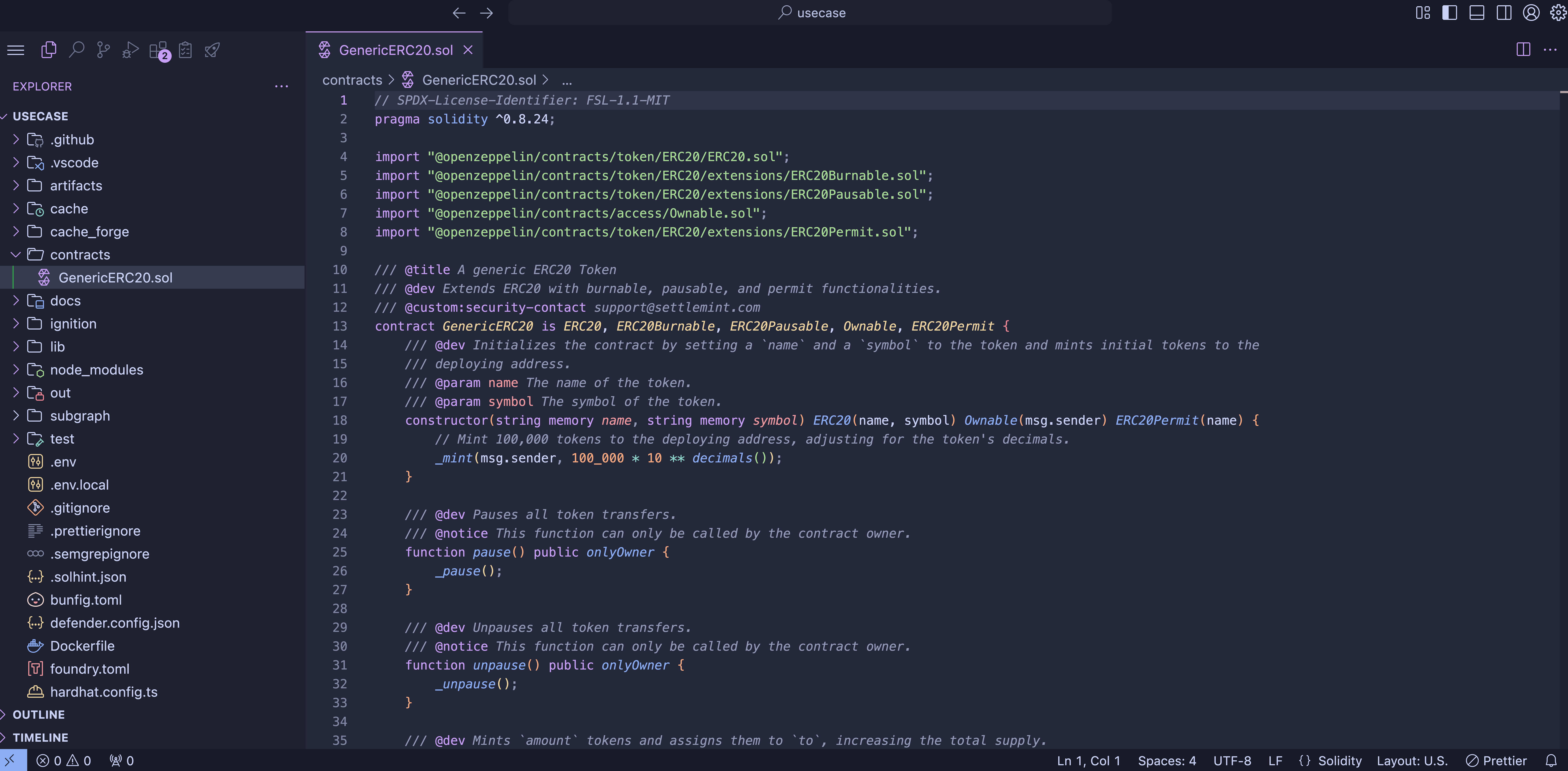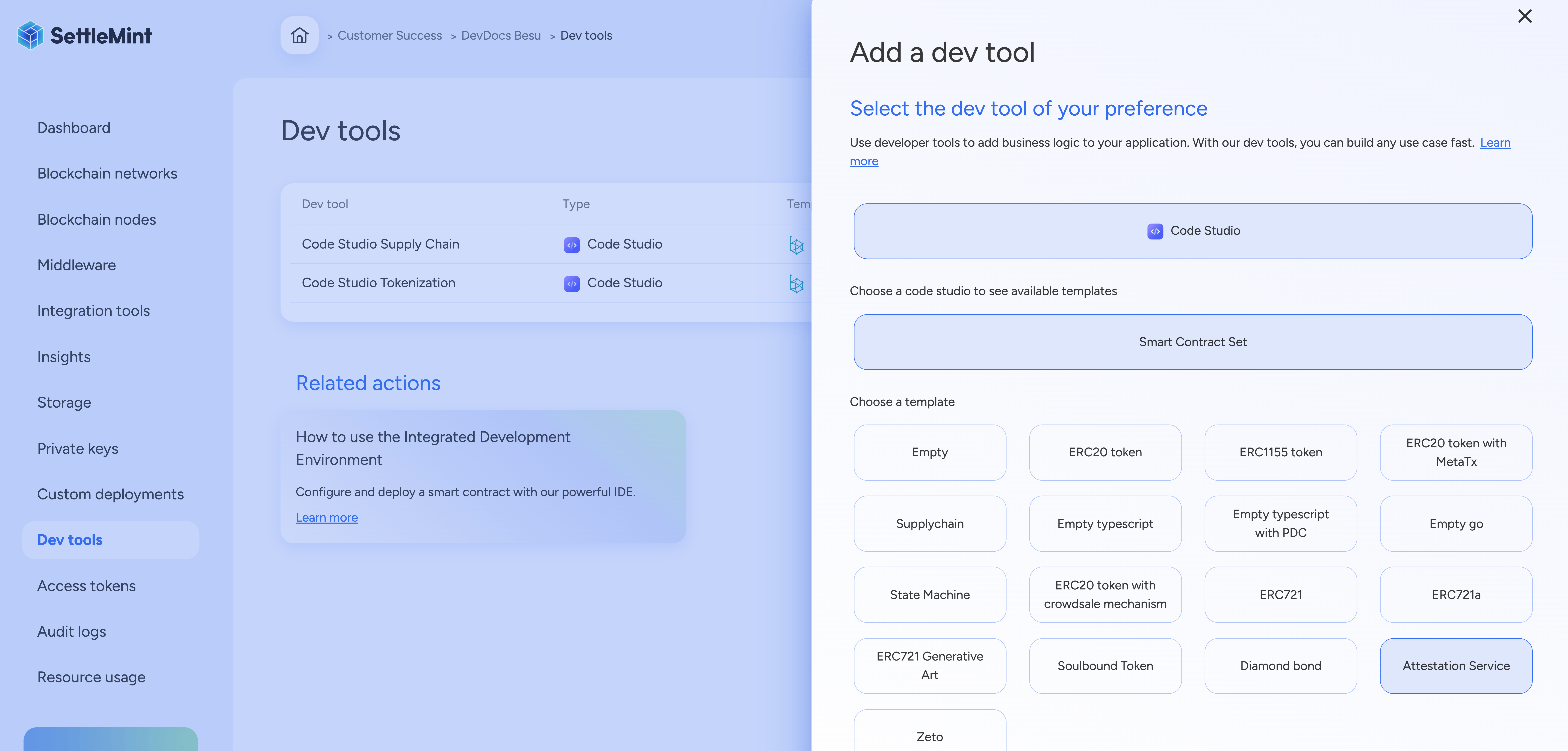Code Studio
Complete guide to SettleMint's Code Studio - a web-based VS Code IDE for blockchain development. Deploy smart contracts, build dApps, and collaborate on blockchain projects with pre-configured tools and templates.
Why choose Code Studio for blockchain development?
For Development Teams: SettleMint's Code Studio eliminates 90% of blockchain development setup time, providing a production-ready environment with pre-configured tools, templates, and CI/CD pipelines.
The Code Studio is a web-based Visual Studio Code IDE designed specifically for blockchain development. Unlike traditional setups that require weeks of configuration, Code Studio provides:
- Zero-setup development environment with all blockchain tools pre-installed
- Smart contract templates for rapid prototyping and deployment
- Integrated testing frameworks (Hardhat, Foundry) for comprehensive validation
- Seamless GitHub integration for enterprise-grade version control
- Built-in deployment pipelines connecting directly to your blockchain networks
With the built-in SettleMint SDK Command Line Interface (CLI), developers can deploy smart contracts, manage infrastructure, and monitor applications without leaving the IDE.
Types of code studio
Currently, we offer the following types of Code Studio:
- Smart contract sets - A powerful tool that accelerates the development of your smart contracts. This code studio comes with pre-built smart contract set templates for your chosen use case, which are easily customizable to match your needs. It also includes compilation and migration scripts that drastically simplify deployment to the relevant blockchain.

A Smart Contract Set is a code studio that comes with a smart contract set template for your chosen use case. It is a powerful tool that accelerates the development of your smart contracts.
You can choose from a wide variety of templates in our open-source template library. Each template includes pre-built smart contracts which you can then customize to meet your specific needs.

Overview of the smart contract deployment process on settlemint
SettleMint's smart contract sets include both Hardhat and Foundry, enabling you to compile, test, and deploy using your preferred framework or a combination of both. This flexibility allows you to optimize your development process to best suit your project needs and preferences.
The following is a high-level overview of smart contract development processes at SettleMint.
1. Adding a smart contract set
- Add dev tool: Navigate to the application you want to create the smart contract set in, then to the dev tools page and press the button "Add dev tool".
- Code studio: Select the "Code studio" option as the type of dev tool.
- Smart contract set: Select the "Smart contract set" option as the type of Code studio.
- Picking Your Template: Pick the template of your choice.
For detailed instructions, please see add a smart contract set.
2. Compiling and configuring the smart contract
- Compiling: Convert your smart contract code into a format that the blockchain can understand and execute.
- Configuring: SettleMint sets all the necessary configurations for you,
- Purpose: Tailors the deployment process to your specific requirements and ensures your contract can run on the blockchain.
3. Deploying and interacting with the smart contract
- Deploying: Upload your compiled smart contract to a blockchain network.
- Interacting: Once deployed, interact with the smart contract through transactions that call its functions.
- Purpose: Makes the contract accessible on the blockchain so users can interact with it and utilize its features to perform actions defined in its logic.
Tools to use
At SettleMint, we provide the option to use either Foundry or Hardhat. Both of these tools allow you to compile and deploy smart contracts within the SettleMint IDE. The workflow in both frameworks is very similar: you compile and then deploy the smart contracts.
Foundry
Foundry is a toolkit for EVM development. It provides tools to compile, test, and deploy smart contracts.
- Initialize Project: Set up your project folder and deploy a Foundry smart contract set.
- Write and Configure Contract: Create your smart contract code in Solidity
and set up your project settings in a
foundry.tomlfile if needed. - Compile and Deploy Contract: Convert your Solidity code into bytecode and deploy your compiled contract to the blockchain network of your choice.
Hardhat
Hardhat is a development environment for EVM software. It provides a flexible and extensible ecosystem for building, testing, and deploying smart contracts.
- Initialize Project: Set up your project folder and deploy a Hardhat smart contract set.
- Write and Configure Contract: Create your smart contract code in Solidity
and set up your project settings in a
hardhat.config.jsfile if needed. - Compile and Deploy Contract: Convert your Solidity code into bytecode and deploy your compiled contract to the blockchain network of your choice.
Key points
- Smart Contracts: Self-executing programs with predefined rules.
- Compiling and Configuring: Converts code into a format the blockchain can run and tailors the deployment process.
- Deploying and Interacting: Uploads the compiled code to the blockchain and makes it accessible for interaction. By following these steps and using the appropriate tools, you can easily create, compile, and deploy smart contracts to automate and secure your business processes on the blockchain.
SettleMint's smart contract templates serve as open-source, ready-to-use foundations for blockchain application development, significantly accelerating the deployment process. These templates enable users to quickly customize and extend their blockchain applications, leveraging tested and community-enhanced frameworks to reduce development time and accelerate market entry.
Open-source smart contract templates under the MIT license
Benefit from the expertise of the blockchain community and trust in the reliability of your smart contracts. These templates are vetted and used by major enterprises and institutions, ensuring enhanced security and confidence in your deployments.
Template library
The programming languages for smart contracts differ depending on the protocol:
- For EVM-compatible networks (like Ethereum), smart contracts are written in Solidity.
- For Hyperledger Fabric, smart contracts (also called chaincode) are written in TypeScript or Go.
Solidity contracts IDE
| Template | Description |
|---|---|
| Empty | A minimal smart contract in Solidity |
| ERC20 Token | Standard ERC20 token implementation |
| ERC20 with MetaTx | ERC20 token with meta-transaction support |
| ERC20 with Crowdsale | ERC20 token with integrated crowdsale |
| ERC1155 Token | Multi-token standard (ERC1155) |
| ERC721 | Standard NFT token (ERC721) |
| ERC721a | Gas-optimized NFT (ERC721A) |
| ERC721 Generative Art | NFT with generative art logic |
| Soulbound Token | Non-transferable token |
| Supply Chain | Asset tracking across supply chain |
| State Machine | State transition logic |
| Diamond Bond | Bond issuance and tracking |
| Attestation Service | Verifiable claim attestations |
Note: The Empty template includes sample contracts (e.g., Counter) for reference. Remove any unused contracts and their references before deploying to production.
Chaincode templates (hyperledger fabric)
| Template | Description |
|---|---|
| Empty (TypeScript) | Minimal TypeScript chaincode |
| Empty with PDC (TypeScript) | Chaincode using private data collections |
| Empty (Go) | Minimal Go chaincode |
Create your own smart contract templates for your consortium
Within the self-managed SettleMint platform, you can create and add your own templates for use within your consortium. This fosters a collaborative environment where templates can be reused and built upon, promoting innovation and efficiency within your network.
To get started, visit: SettleMint GitHub Repository
Insights
Comprehensive guide to blockchain analytics and monitoring with SettleMint's integrated explorers. Learn to track transactions, monitor smart contracts, and analyze network performance with Blockscout and Hyperledger Explorer.
AI Code Assistant
Complete guide to RooCode AI assistant for blockchain development. Learn to generate smart contracts, debug code, and boost development productivity by 3x with SettleMint's integrated AI coding assistant.